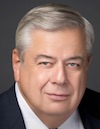|
|
It is somewhat astonishing that on Capitol Hill, legislators still go to their offices, at least Tuesday through Thursday, staff reports to work, hearings are being held and lobbying continues unabated. Surprising, because the legislative process is almost completely stalled in a way we haven’t seen for some time.
When President Obama nominated centrist, non-controversial D.C. Circuit Court of Appeals Judge Merrick Garland for the vacancy on the nine-member Supreme Court, Senate Majority Leader Mitch McConnell (R-KY), immediately said there was no point in holding hearings or taking a vote until the next president is elected. With another year to go in office, Obama retorted that he has fulfilled his constitutional duty and now it is up to the Senate to vote Garland up or down.
It was news when six Republicans said they would at least meet with Garland. But McConnell will not back down on refusing to hold a vote before the November election, although if Hillary Clinton is elected in November, he might hold a vote on Garland before the end of the year to stave off a potentially more liberal nominee. And some Republicans might balk at the idea of Trump choosing a justice. But the issue, as McConnell said clearly, is not Garland, widely respected by both Republicans and Democrats and a previous consensus nominee.
The issue is that McConnell has persuaded enough Republicans to back him up to prevent Obama from nominating a Supreme Court justice and having him confirmed, although Obama won reelection with a five-million-vote surplus. McConnell’s argument, ironically once made by Joe Biden in 1992, is that during an election cycle, no major decisions should be made until the votes are cast. The obvious counter argument is that the president does not stop being president during the year-long election process. The White House complained that it is “appalling” that the Senate is using the excuse of politics not to do its job. Six justices have been confirmed to the Supreme Court in the final year of a presidency during the last century. The real issue is, of course, the possibility that Obama’s choice could shift the balance of the nation’s highest court from conservative to liberal as the vacancy was caused by the unexpected death of conservative Justice Antonin Scalia. Obama insists his choice, Garland, is not a known liberal; left-leaning groups, in fact, are upset that Garland does not have a clear record on major social issues such as abortion, campaign financing, labor dues, environmental regulations, etc. But there would be far less of a brouhaha if Obama were filling a vacancy left by a liberal justice.
The bitterness, confusion and anger of the presidential race have infused Washington and call to mind the Joe McCarthy era, where legislators literally hated each other. Establishment Republicans are openly kicking themselves for not taking the now-likely Trump nomination more seriously when a Stop Trump movement might have had some success. While there is a lot of talk about an “open” GOP convention in Cleveland in July because Trump may not have all 1,237 delegates needed for victory on the first ballot, that is not very probable. As Trump noted, if he has a majority of delegates and is denied the nomination, his supporters would “riot.” The mathematics of a possible Kasich nomination on a second ballot are formidably against him. Less so for Cruz, but also unlikely. There is also desperate talk of a third-party candidacy; that is not going to happen.
Of course, journalists are salivating at the possibility of another 1976, the convention when Ronald Reagan mounted a strong challenge to Gerald Ford but lost. The press has a love-hate relationship with Trump; on one hand, he is good copy; on the other hand, he mocks and disdains the press and invites his supporters to jeer at reporters and make it more difficult for them to do their job. He has required volunteers to sign non-disclosure agreements, usually reserved only for paid employees privy to proprietary information. And he pens reporters up so they can’t talk to his supporters during his rallies.
Having all but dispatched Bernie Sanders to the status of an also-ran on Super Tuesday, Hillary Clinton is turning her attention to how to deflate the Trump balloon, if that is possible. Her advisers are divided on how tough they want her to be. While they want her to take Trump on, they also are wary of criticism that she sometimes sounds strident and a little desperate when she goes on the attack. She will not make Marco Rubio’s mistake of getting down in the mud with Trump, but there is worry among supporters about how she will handle his personal attacks.
Trump’s supporters are unusually passionate in their defense of him; hers, not so much. He is winning white males without a college education, the less affluent, the angry and those who are fed up with the status quo in Washington. She is winning with college educated females, minorities and unions. Her major aim is to hit Trump over and over on the issues, which they disagree on down the line. Almost the only thing they agree on is that the United States badly needs to rebuild its infrastructure.
Trump’s aim is to move to the center, not difficult especially with so many supporters so un-appalled by his past outlandish statements such as banning Muslims and making Mexico pay for a wall across the southern U.S. border. His frequent use of misogynistic language would have been grounds for the firing of any CEO who doesn’t own the company, but has not dissuaded ardent supporters although it may be pushing more women into Clinton’s camp.
But Trump also will try to court establishment Republicans, a much more difficult task. They will be forced to choose between trying to win the White House with Trump and losing the White House to Hillary Clinton. A true rock-and-a-hard-place dilemma. But, interestingly enough, while one-fourth of Republicans say they don’t want to vote for Donald Trump, one-fourth of Democrats say they don’t want to vote for Hillary Clinton.
As they say, we live in interesting times.
* * *
Robert L. Dilenschneider is chairman and founder of the Dilenschneider Group, Inc.



 The ridiculously high prices Americans are paying at the supermarket might influence how—or if—they vote in November.
The ridiculously high prices Americans are paying at the supermarket might influence how—or if—they vote in November. At a moment in history when there are so many conflicts among peoples here and abroad, let us put our differences aside and celebrate this wonderful season in a spirit of togetherness.
At a moment in history when there are so many conflicts among peoples here and abroad, let us put our differences aside and celebrate this wonderful season in a spirit of togetherness. The news announcing the death of Henry Kissinger, the last of the prevaricating politicians and so-called statesmen who stole my future and that of thousands of other young Americans, got me thinking about Walter Cronkite.
The news announcing the death of Henry Kissinger, the last of the prevaricating politicians and so-called statesmen who stole my future and that of thousands of other young Americans, got me thinking about Walter Cronkite.


 Have a comment? Send it to
Have a comment? Send it to 
No comments have been submitted for this story yet.